Related Research Articles

The Trilateral Commission is a nongovernmental international organization aimed at fostering closer cooperation between Japan, Western Europe and North America. It was founded in July 1973, principally by American banker and philanthropist David Rockefeller, an internationalist who sought to address the challenges posed by the growing economic and political interdependence between the U.S. and its allies in North America, Western Europe, and Japan. The leadership of the organization has since focused on returning to "our roots as a group of countries sharing common values and a commitment to the rule of law, open economies and societies, and democratic principles".

The Council on Foreign Relations (CFR) is an American think tank specializing in U.S. foreign policy and international relations. Founded in 1921, it is an independent and nonpartisan 501(c)(3) nonprofit organization. CFR is based in New York City, with an additional office in Washington, D.C. Its membership has included senior politicians, secretaries of state, CIA directors, bankers, lawyers, professors, corporate directors, CEOs, and prominent media figures.

Winston Lord is a retired American diplomat. As Special Assistant to the National Security Advisor and then as Director of Policy Planning at the United States Department of State, Lord was a close adviser to Henry Kissinger and was instrumental in bringing about the renormalization of U.S.-China relations in the 1970s.
Aaron Louis Friedberg is an American political scientist. He served from 2003 to 2005 in the office of the Vice President of the United States as deputy assistant for national-security affairs and director of policy planning.

The School of Advanced International Studies (SAIS) is a graduate school of Johns Hopkins University based in Washington, D.C. The school also maintains campuses in Bologna, Italy and Nanjing, China.
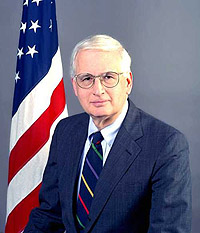
James Stapleton Roy is a former senior United States diplomat specializing in Asian affairs. A fluent Chinese speaker, Roy spent much of his career in East Asia, where his assignments included twice in Bangkok, Hong Kong, Taipei, and Beijing, once in Singapore, and Jakarta. He also specialize in Soviet affairs, and had served in Moscow at the height of the Cold War. Roy also served as Assistant Secretary of State for Intelligence and Research from 1999 to 2000.

David M. Lampton is the George and Sadie Hyman Professor and director of China studies emeritus at the Johns Hopkins University's Paul H. Nitze School of Advanced International Studies (SAIS) and former chairman of The Asia Foundation.
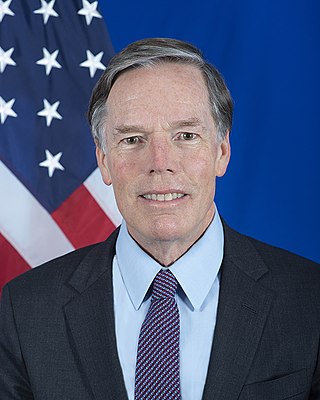
Robert Nicholas Burns is an American diplomat and international relations scholar who has been serving as the United States ambassador to China since 2022.

Wilsonianism, or Wilsonian idealism, is a certain type of foreign policy advice. The term comes from the ideas and proposals of United States President Woodrow Wilson. He issued his famous Fourteen Points in January 1918 as a basis for ending World War I and promoting world peace. He was a leading advocate of the League of Nations to enable the international community to avoid wars and end hostile aggression. Wilsonianism is a form of liberal democratic internationalism.

Michael Jonathan Green is an American Japanologist currently serving as CEO of the United States Studies Centre and senior advisor at the Center for Strategic and International Studies (CSIS). He is also a member of Radio Free Asia's board of directors and Center for a New American Security (CNAS)'s board of advisors.
Joseph A. Cari Jr. is an American merchant banker, public policy expert, and philanthropist currently residing in New York. Cari's professional career has spanned the worlds of merchant banking, media, public policy, politics, law and education.

The Hopkins–Nanjing Center, formally the Johns Hopkins University–Nanjing University Center for Chinese and American Studies, is an international campus of the Paul H. Nitze School of Advanced International Studies and a joint educational venture between Johns Hopkins University and Nanjing University that opened in Nanjing, China, in 1986. Former Hopkins President Steven Muller and former NJU President Kuang Yaming worked together to create the center, recognizing the importance of improved understanding and relations between their respective countries. Muller believed China to be "the country of the future."

Helmut Sonnenfeldt, also known as Hal Sonnenfeldt, was an American foreign policy expert. He was known as Kissinger’s Kissinger for his philosophical affinity with and influence on Henry A. Kissinger, the architect of American foreign policy in the Nixon and Ford administrations.
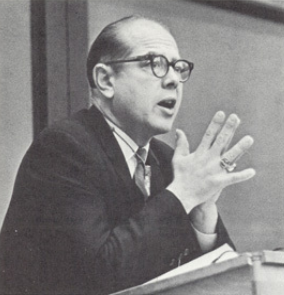
Robert Anthony Scalapino was an American political scientist and East Asia specialist. He was a co-founder and inaugural chairman of the National Committee on United States–China Relations. Together with his co-author Chong-Sik Lee, he won the 1974 Woodrow Wilson Foundation Award for the best book on government, politics, or international affairs from the American Political Science Association. Scalapino's daughters include the artist Diane Sophia and poet Leslie Scalapino (1944–2010).

The Kissinger Institute on China and the United States is a non-profit research organization dedicated to promoting greater understanding of issues in the relationship between the People's Republic of China and the United States and their impact on both countries and the world. It was inaugurated in 2008 and is part of the Woodrow Wilson International Center for Scholars. Its current director is Robert Daly.
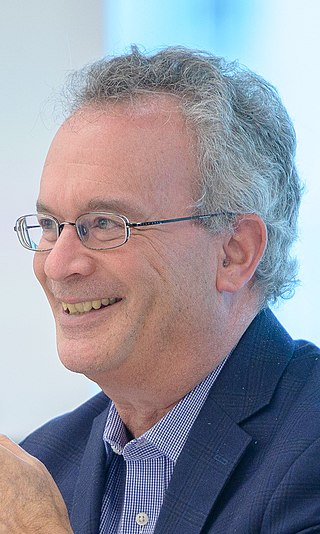
James M. Goldgeier is a professor of international relations at the School of International Service at American University in Washington, D.C., where he served as dean from 2011 to 2017.
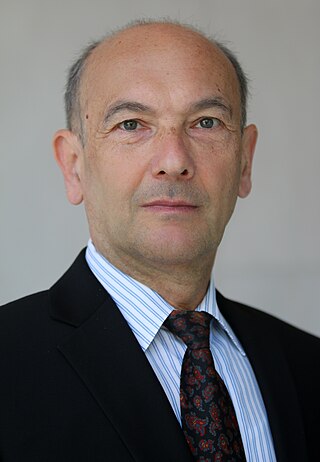
Igor Alexandrovich Zevelev is a Russian political scientist.

The Foreign Affairs Policy Board is an advisory board that provides independent advice and opinion to the secretary of state, the deputy secretary of state, and the director of policy planning on matters concerning U.S. foreign policy. The board reviews and assesses global threats and opportunities, trends that implicate core national security interests, tools and capacities of the civilian foreign affairs agencies, and priorities and strategic frameworks for U.S. foreign policy. The board meets in a plenary session several times a year at the U.S. Department of State in the Harry S. Truman Building.
Arthur Doak Barnett was an American journalist, political scientist, and public figure who wrote about the domestic politics and the foreign relations of China and United States-China relations. He published more than 20 academic and public interest books and edited still others. Barnett's parents were missionaries in China, and Barnett used his Chinese language ability while travelling widely in China as a journalist before 1949. He grounded his journalism and his scholarship in exact detail and clear language. Starting in the 1950s, when there were no formal diplomatic relations between the United States and the People's Republic of China, he organized public outreach programs and lobbied the United States government to put those relations on a new basis.
Sergey S. Radchenko is a Soviet-born British-Russian historian. He is the Wilson E. Schmidt Distinguished Professor at the Henry A. Kissinger Center for Global Affairs, Johns Hopkins School of Advanced International Studies, and visiting professor at Cardiff University. He has served as a Reader at Aberystwyth University, a Global Fellow and a Public Policy Fellow at the Woodrow Wilson Centre, and as the Zi Jiang Distinguished Professor at East China Normal University (Shanghai).
References
- 1 2 3 4 "Robert Daly: Many of his paths lead to China". China Daily USA. 19 December 2014. Retrieved 16 September 2017.
- ↑ "JHU SAIS Names New American Co-Director of Hopkins-Nanjing Center". Johns Hopkins University. 18 June 2001. Retrieved 16 September 2017.
- 1 2 "Robert Daly Appointed to Head Wilson Center Kissinger Institute on China and the United States". Wilson Center. 26 August 2013. Retrieved 16 September 2017.
- 1 2 "Robert Daly". Wilson Center. Retrieved 16 September 2017.
- ↑ "U.S.-China Policy: Ignoring the Strategic Challenge" (PDF). UMD Department of Government and Politics. 24 April 2017. Retrieved 16 September 2017.
- ↑ "The Task Force on U.S.-China Policy". Asia Society. Archived from the original on January 8, 2024. Retrieved 2024-01-29.